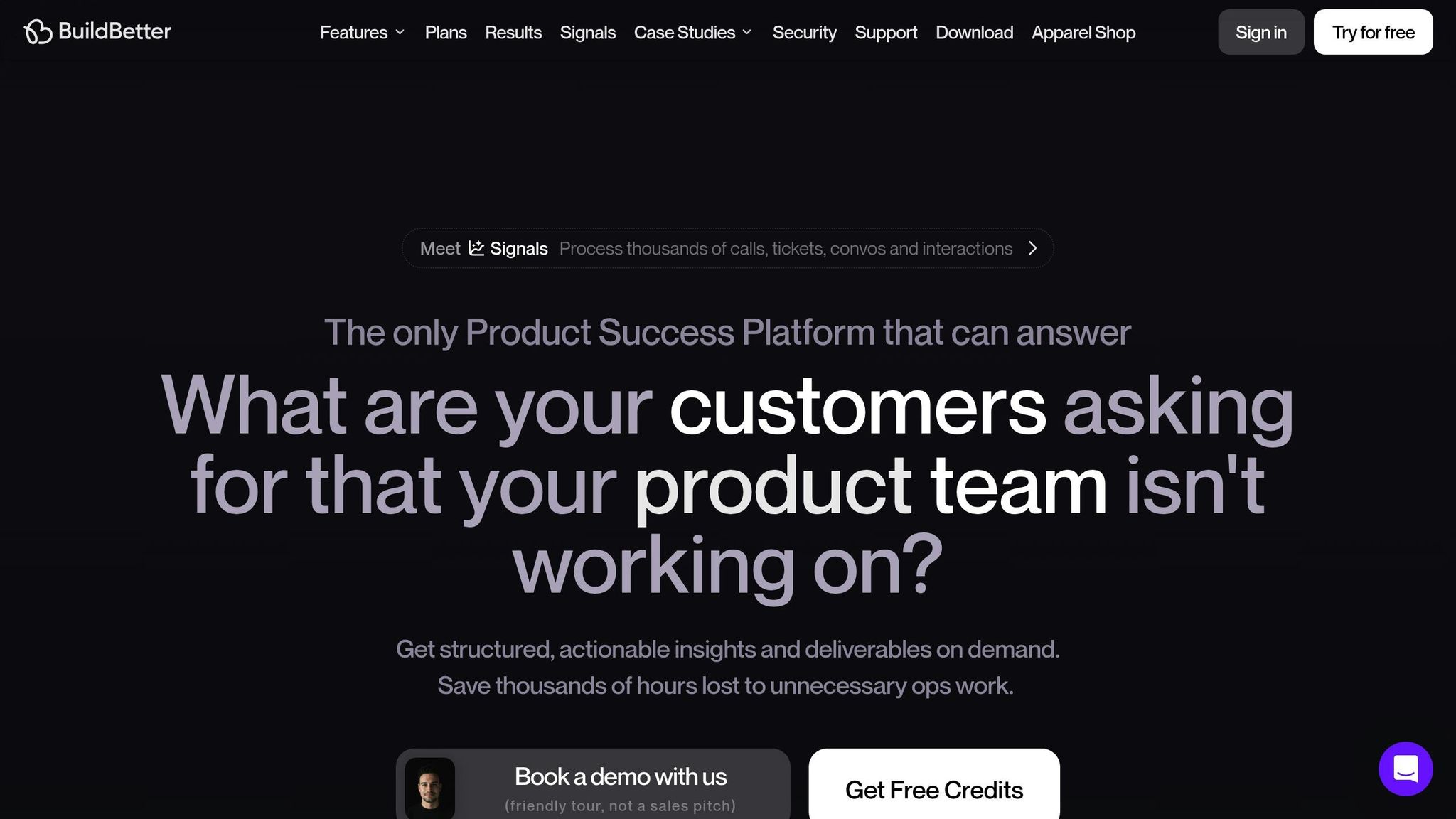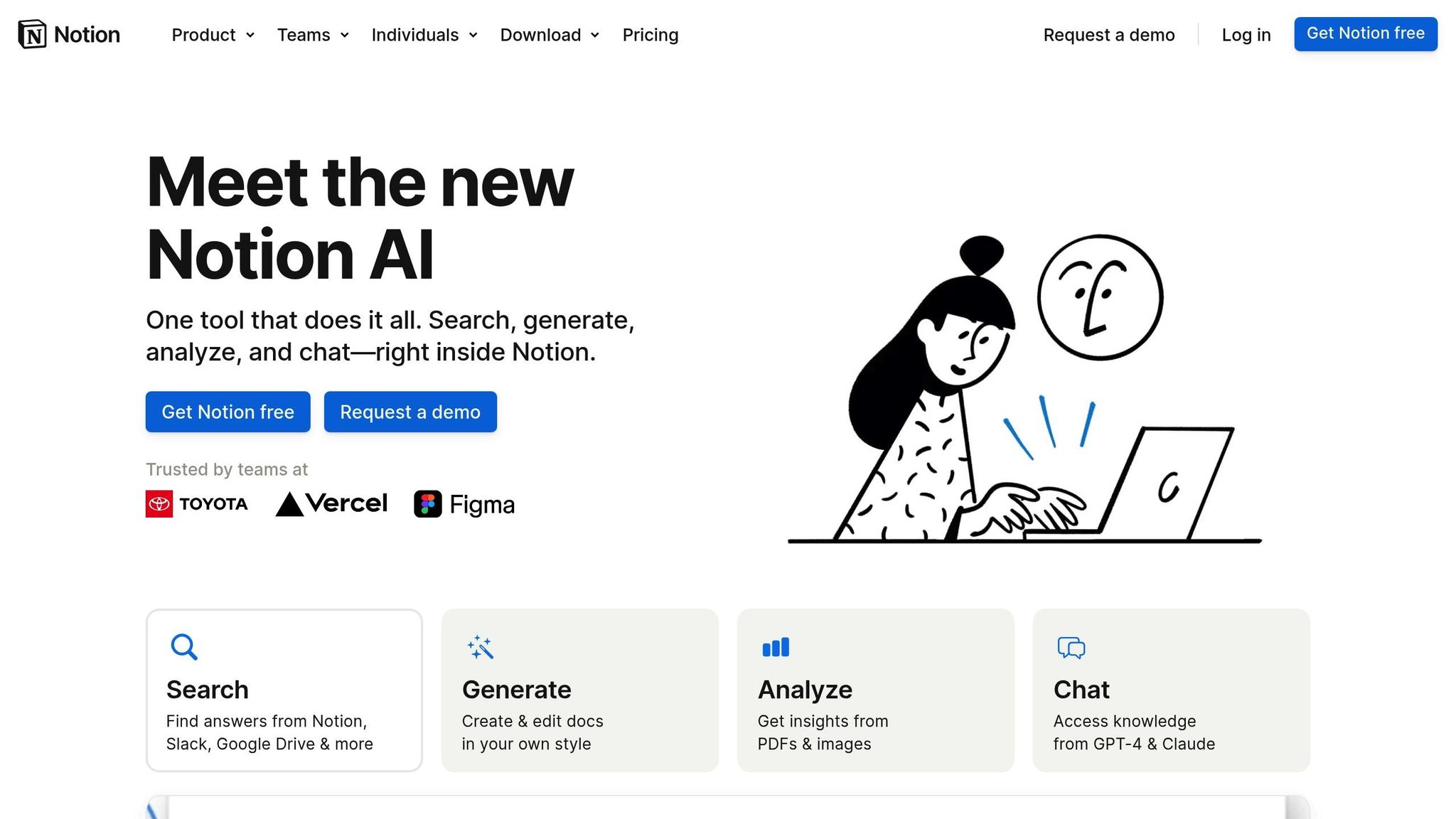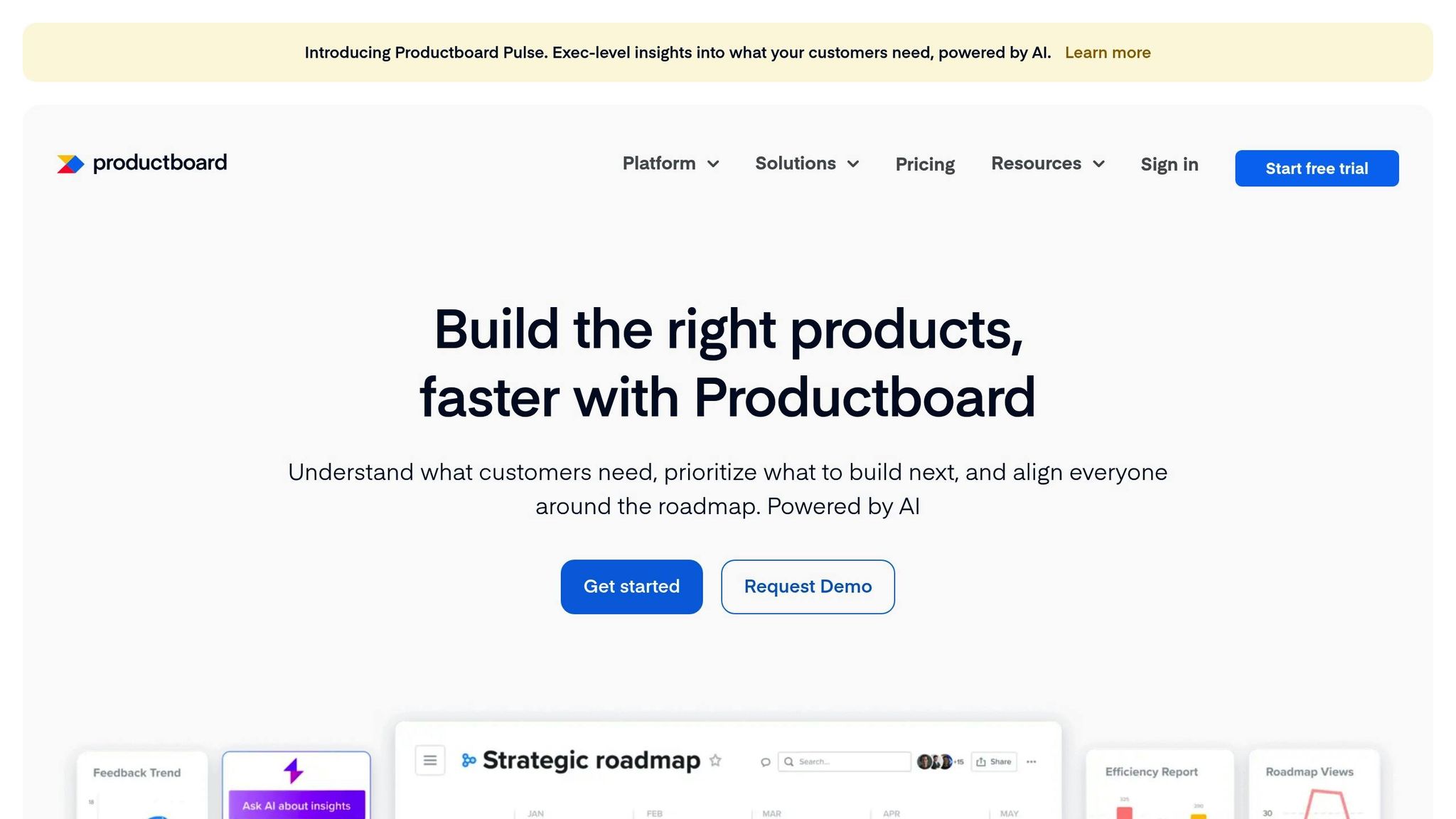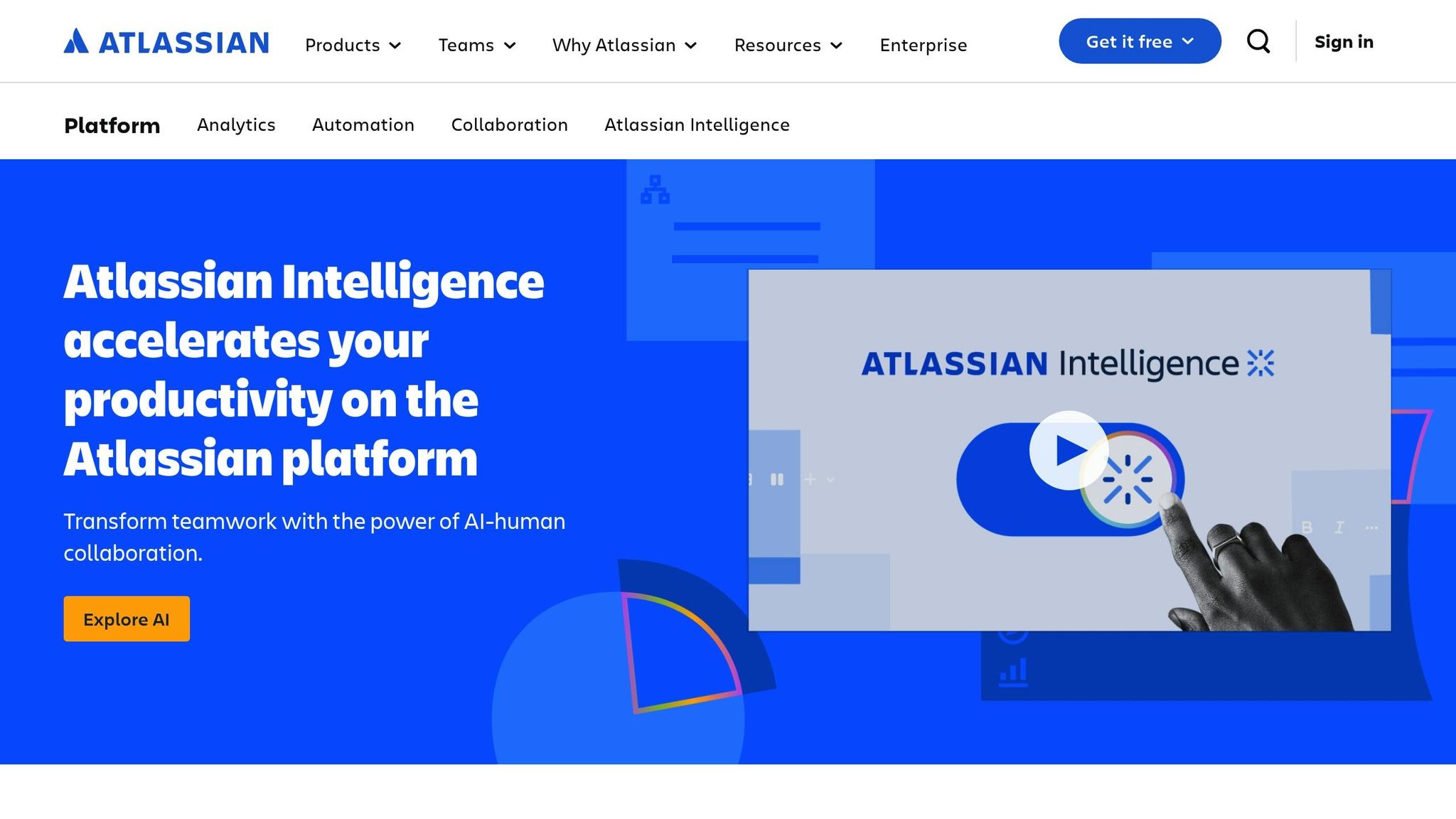Top AI tools for product managers (2025)
Explore how AI tools are revolutionizing product management by enhancing customer insights, improving efficiency, and streamlining workflows.

AI is transforming product management. 75% of product managers use AI tools, enabling faster decisions, improved customer retention (+30%), and shorter time-to-market (-30%). Here’s how AI tools are making an impact:
- Customer Insights: Sentiment analysis boosts satisfaction by 25%.
- Efficiency: Automation cuts operational costs by 40%.
- Forecasting: Demand predictions are 20% more accurate.
- Testing: A/B test insights arrive 15–30% faster.
Key Tools for 2025:
- BuildBetter: B2B platform for customer insights via 100+ integrations.
- Notion AI: Streamlines documentation and team communication.
- Productboard AI: Links feedback to features for smarter roadmaps.
- Jira AI: Automates project tracking and workflow optimization.
- Aha! AI: Enhances roadmap planning and idea management.
Quick Comparison
| Tool | Focus Area | Key Features |
|---|---|---|
| BuildBetter | Customer insights | Sentiment analysis, feature requests, roadmap alignment. |
| Notion AI | Documentation | PRDs, AI-powered search, team communication. |
| Productboard AI | Feedback prioritization | Auto-linking feedback to features, trend analysis. |
| Jira AI | Workflow optimization | Predictive task assignment, bottleneck detection, natural language queries. |
| Aha! AI | Roadmap planning | Idea grouping, automated release notes, revenue analysis. |
AI tools are reshaping product management workflows, making teams faster, more efficient, and customer-focused.
AI for Product Managers - Top AI Tools for PMs & The Future ...
1. BuildBetter

BuildBetter is an AI-driven insights platform designed for B2B product teams. It integrates internal data like call recordings and chat logs with external sources such as customer surveys, support tickets, and product feedback. With over 100 integrations - including Zoom, Slack, Jira, Salesforce, and Intercom - it provides a comprehensive view of your product ecosystem. Here's a closer look at its main features:
- Smart Data Processing: BuildBetter’s AI organizes scattered data into useful insights. Its advanced backend ensures responses are up to 10 times faster.
- Customer Insights Analysis: The platform pinpoints customer needs by identifying common feature requests, recurring issues, and reasons potential customers hesitate - all aligned with your roadmap. It also analyzes customer sentiment during pitches and demos to highlight what resonates most.
-
Streamlined Workflows: BuildBetter’s chat-based AI mimics product management workflows through a structured process:
- Question Parsing: Breaks down complex queries.
- Tool Selection: Chooses the right analysis tools.
- Filter Application: Ensures only relevant results are shown.
- Response Formatting: Presents insights in a clear, actionable way.
"What are your customers asking for that your product team isn't working on?" – BuildBetter
This question embodies BuildBetter’s mission: helping product managers identify gaps between customer needs and current priorities. Its AI ensures accurate insights, making workflows more efficient.
BuildBetter also offers tiered pricing plans suitable for teams of any size. Every plan includes access to its advanced chat features, ensuring teams can make informed, data-driven decisions regardless of budget.
2. Notion AI

Notion AI simplifies documentation and knowledge management for product managers. While many AI tools focus on data insights, Notion AI stands out by improving team communication and documentation workflows. It integrates with various knowledge sources, like Slack, Google Docs, and advanced AI models such as GPT-4 and Claude.
Beyond tools that focus on customer insights, Notion AI sharpens internal processes. It turns rough bullet points into polished product requirement documents (PRDs), adapts technical language for different audiences, and ensures consistent writing quality across team communications.
Its natural language processing makes finding information easier. The AI-powered search feature cuts down query time, saving companies time and money on managing their knowledge bases. It also analyzes user research data by spotting patterns and creating actionable summaries from customer feedback and market research.
"It's really powerful when Notion AI surfaces organizational knowledge that I didn't know to look for, because I didn't even know it existed." – Senior Technical Instructor Faith Lierheimer, dbt Labs
Product managers can unlock more value from Notion AI by:
- Embedding AI-generated summaries in templates for quick overviews
- Simplifying detailed technical specs without losing accuracy
- Using AI brainstorming tools to create detailed project plans
Notion AI is available as an add-on for $8/member per month (annual billing) or $10/member per month (monthly billing).
"It's the slickest, most practical implementation of generative AI for text that I've used to date." – Alex Heath, Deputy Editor at The Verge
3. Productboard AI

Productboard AI enhances how you manage customer feedback and plan features by integrating OpenAI-powered tools. It processes large volumes of customer feedback and connects it directly to related feature ideas, making it easier to prioritize features and create data-backed roadmaps.
Here’s what Productboard AI offers:
- AI-Generated Feature Specs: Automatically creates feature specifications based on linked customer feedback.
- Smart Feedback Analysis: Quickly extracts insights and generates summaries from long customer conversations, typically within 3–6 hours.
- Intelligent Search: Helps identify related feedback patterns across your workspace to validate new opportunities.
- Auto-Topic Generation: Summarizes recurring themes in feedback to spotlight emerging trends.
By enabling Productboard AI and its auto-linking capabilities, you can create a continuous feedback loop that ties customer insights directly to feature priorities.
Productboard AI ensures data privacy by using only workspace-specific data and does not train its models on external customer information. The full AI suite is included with Productboard Pulse on Pro and Enterprise plans.
4. Jira AI

Jira AI, powered by Atlassian Intelligence, simplifies project tracking and team collaboration by automating tasks and delivering smart insights.
Key Features:
-
Smart Task Management
The predictive assignee tool suggests the top five team members for tasks with an impressive 86% accuracy. -
AI-Powered Documentation
The enhanced editor helps create polished project documentation. It generates detailed user stories, adjusts the tone for better communication, breaks large tasks into smaller steps, and provides real-time context using AI definitions. -
Intelligent Workflow Optimization
By analyzing work patterns, Jira AI predicts potential bottlenecks, updates timelines instantly, and suggests workflows tailored to individual work habits.
"Atlassian Intelligence has helped bring our DevOps practices into Slack to reduce context-switching. Alongside AI answers and issue summaries, harnessing Atlassian Intelligence has led to a boost in our developer experience."
– Martin Brignall, Developer Tooling Specialist, OVO
Natural Language Processing
With the Natural Language to JQL converter, product managers can search for tasks using simple, everyday language.
Cross-Tool Integration
Jira AI pulls data from sources like Git commits, Slack, customer feedback, and Confluence, creating a unified project view. This reduces the need to switch between tools and speeds up decision-making.
AI Summaries and Definitions
Summarization tools condense long comment threads, highlight key decisions, and clarify company-specific terms with AI definitions. For instance, when working with engineers across different countries, Jira AI can automatically simplify and contextualize requirements documentation - cutting down on unnecessary meetings. These features make Jira AI an essential tool for improving product management workflows.
5. Aha! AI
Aha! AI simplifies product management by using artificial intelligence to improve roadmap planning and team collaboration. Trusted by over 1,000,000 product builders, this AI assistant is built right into the platform's text editor, making it accessible in notes, record descriptions, and comments.
Smart Idea Management
The Ideas Exploration tool scans customer requests, finds common themes, and groups similar ideas together. This helps product managers quickly grasp customer needs and prioritize features based on clear, data-backed insights.
AI-Powered Documentation
The platform's AI tools include:
-
Customer Persona Creation
Draft customer personas using existing product data and user feedback. -
Automated Release Notes
Save time by letting the system generate concise release notes from recently completed work. -
Pattern Matching
Categorize requests and identify recurring themes in idea names and descriptions, making it easier to focus on important concepts.
"Embracing AI in your work, even in small ways, can lead to new and exciting possibilities - right where you are at."
Revenue Impact Analysis
Aha! AI uses advanced analytics to summarize revenue opportunities from idea comments and proxy votes. This feature helps product managers prioritize features that balance customer demand with business goals.
Best Practices for Implementation
- Use AI-generated content as a starting point, then refine it with your team.
- Experiment with AI prompts to improve results.
- Create team-specific guidelines to maintain consistency.
"We are thrilled to announce that Aha! software now includes built-in AI capabilities to augment your thinking and streamline document creation."
Aha! AI helps teams stay aligned by turning complex documents into actionable items and crafting clear, polished communications that minimize misunderstandings. By combining smart automation with collaboration tools, Aha! AI is a powerful resource for product management teams aiming for efficiency and informed decision-making. It signals the growing role of AI in shaping the future of product management.
Next Steps for AI in Product Management
AI tools in product management are evolving fast, creating both opportunities and challenges for competitive teams. New trends are set to change how AI is used in this field.
Emerging Trends and Impact
By 2025, most product managers are expected to depend on AI for faster development, lower costs, and better forecasting. These changes will reshape team operations and lead to measurable improvements in performance metrics.
Practical Implementation Strategies
-
Data Quality and Integration
Build a solid data infrastructure with reliable collection methods and clean, high-quality datasets. -
Team Enablement
Improve team productivity by offering AI training and documenting workflows clearly. -
Ethical AI Development
Ensure transparency, regularly check for biases, and safeguard data security.
These steps can help teams achieve measurable improvements.
Real-World Success Stories
One example comes from Deloitte Analytics Institute. They created a machine learning model that predicts failures two weeks in advance. The results? A 25% boost in productivity, a 70% drop in breakdowns, and a 25% reduction in maintenance costs.
Future Outlook
Looking ahead, AI's role in product management is expected to grow even further. By 2025, global spending on AI systems is projected to hit $110 billion.
Advanced Capabilities
| Feature | Benefit |
|---|---|
| Demand Forecasting | 20% more accurate predictions |
| Automated Testing | 15–30% quicker insights |
| Customer Insights | 25% higher satisfaction rates |
Strategic Considerations
Product managers should gear up for AI's increasing influence in areas like:
- Streamlining sprint management
- Identifying cybersecurity risks
- Automating market research
- Maintaining ethical AI standards
The future of product management will depend on blending human expertise with AI tools. Teams that embrace these technologies while prioritizing ethics and measurable results will lead in this changing landscape.